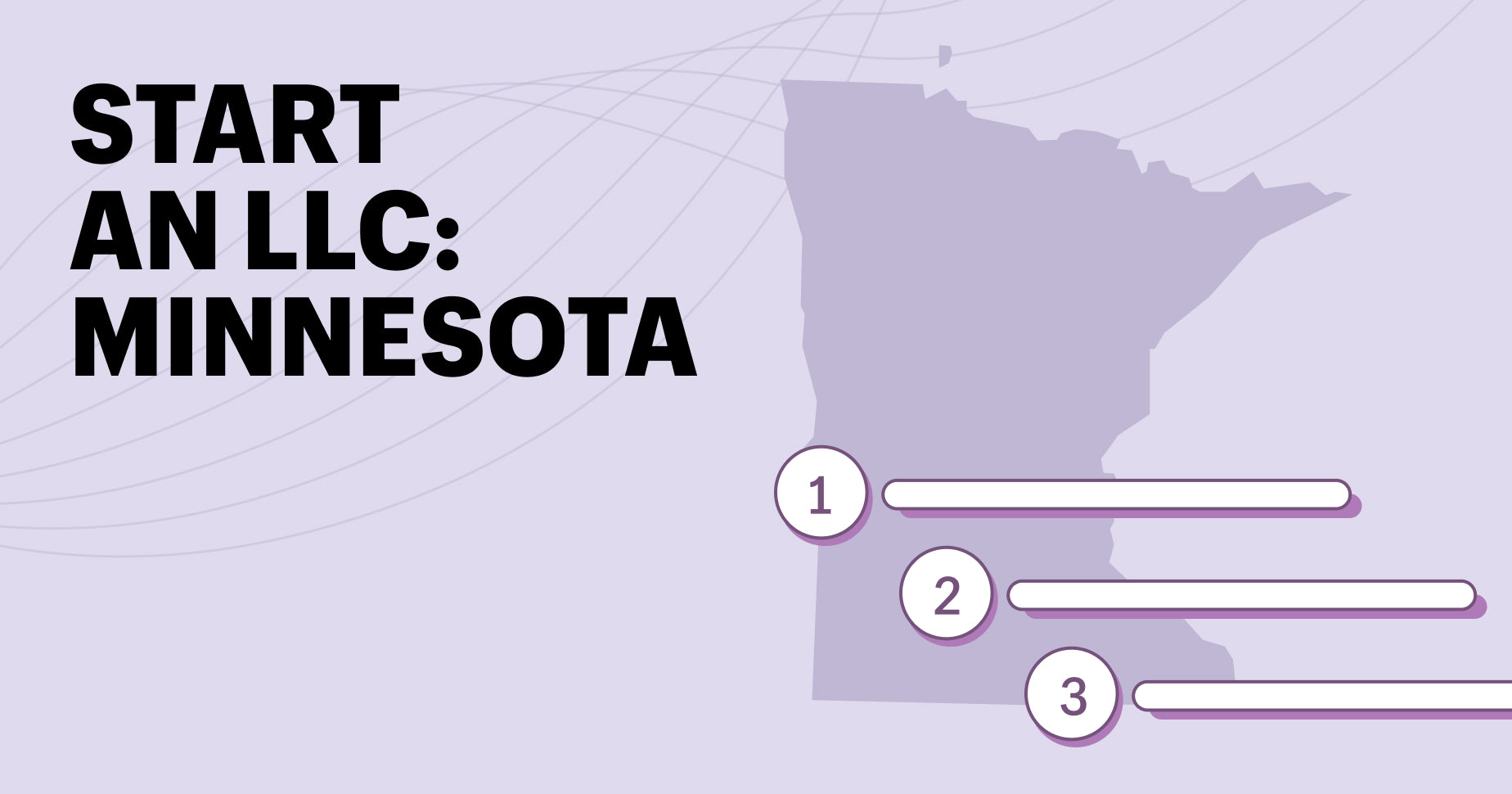
This post is for information only. You are responsible for reviewing and using this information appropriately. This content doesn’t contain and isn’t meant to provide legal, tax, or business advice. Requirements are updated frequently and you should make sure to do your own research and reach out to professional legal, tax, and business advisers, as needed. Businesses outside of Minnesota will have different steps and requirements. To sell products using the Shopify platform, you must comply with the laws of the jurisdiction of your business and your customers, the Shopify Terms of Service, the Shopify Acceptable Use Policy, and any other applicable policies.
In addition to consistently ranking among the best places in the United States to live and work, Minnesota can be an incredibly exciting state in which to start a business. Minnesota leads the nation in a five-year business survival rate. That’s not surprising since new Minnesota business owners enjoy low operating costs, competitive tax rates, and easy-to-navigate administrative startup processes.
How to start an LLC in Minnesota
What is an LLC?
A limited liability company (LLC) is a common business entity for small businesses in the US. They can be formed by one or more owners, which are known as “members”—LLCs with more than one owner are called “multi-member” LLCs, while LLCs with a sole owner are “single-member” LLCs. The primary structural advantage of forming your company as an LLC is owners generally cannot be held personally responsible for legal and crediting claims against their business.
LLCs also enjoy advantages when it comes to federal tax. LLCs are considered “pass-through” entities by the US government, much like a sole proprietorship or partnership. This means any income generated by the LLC is taxed a single time at members’ individual tax rates—as opposed to corporations, which pay taxes both on the company’s profit and the income received personally by owners (known as “double taxation”).
Is an LLC the right business structure for you?
There are various types of business structures you might form in Minnesota. Whether you choose an LLC or another business structure will depend largely on your personal business goals and needs. An LLC might be a good fit if:
- You want to limit your personal liability. LLC owners are generally not liable for any legal claims or debts incurred by the business.
- You want to limit your tax obligations. LLCs avoid taxation on corporate income; profits are only taxed one time at a member’s personal-income level.
- You don’t need to fundraise by issuing shares. Unlike C corporations, for example, LLCs are not able to issue stock or have shareholders. While this might limit a business’s ability to raise money from investors, it can also simplify the LLC’s regulatory treatment.
1. Name your Minnesota LLC
Choosing a business name is an important decision in the early stages of building your Minnesota LLC. There are two guidelines when naming your Minnesota LLC:
- Your name must be unique. The LLC’s name must be different by at least one letter or numeral from any other business name already on file in the state. You can check name availability through the state Secretary of State’s office.
- Your name must include the entity type. All LLCs in Minnesota must have the words “Limited Liability Company,” “L.L.C.,” or “LLC” in their names.
It costs $55 to reserve a name for your LLC online; $35 to do so by mail or in person. Reservations hold for up to 12 months.
2. Create a business plan
A Minnesota LLC business plan should include your LLC’s name along with a brief description of its function. The plan should also include a detailed market analysis, lay out the business’s organizational structure, describe products or services, identify target customer profiles, and detail plans for marketing, logistics, and finance.
3. Get an federal employer identification number (EIN)
For tax purposes, your Minnesota LLC needs a federal employer identification number (EIN). You can apply for this number, which identifies your LLC to both state and federal tax authorities, by applying (for free) through the Internal Revenue Service (IRS) website.
4. Choose a registered agent in Minnesota
Your Minnesota LLC is required to have a registered agent appointed and available at all times. These are individuals or services authorized to accept legal correspondence and documents from the Minnesota state government on your behalf. In Minnesota, registered agents must have an office within the state. If the agent is a service, they must be authorized to conduct business in Minnesota; if the agent is a person, they must reside in Minnesota. The agent has to be available in person to sign for any correspondence during normal business hours, and must be findable at a street address in the state (a PO box is not acceptable).
5. File your Minnesota Articles of Organization
Articles of Organization establish your LLC in Minnesota and inform the government of essential business information. To prepare and file your articles, provide the following:
- Your LLC’s name
- The name and location of any offices for your LLC
- The name and location of your registered agent
- The name, address, and signature of the party authorized to file the articles within your LLC (a manager, or perhaps one or more LLC members)
- An email address for receiving official notices regarding your application status
- A contact name with a daytime phone number
Once you file your Articles of Organization (available online or by mail), the Secretary of State’s office will review the filing, and if approved, your LLC will become a recognized business entity in Minnesota. From this point on, you are required by state law to file an annual report with the Secretary of State’s office to remain in good standing. It costs $135 to file your articles by mail or in person, and $155 to do so online.
Once you establish your business in Minnesota, you will have to file an annual report with the Secretary of State’s office for a small fee of $25 to $45.
6. Obtain business licenses and permits
Not all businesses are required by Minnesota law to obtain a business license. But certain businesses are required to carry a license or permit specific to certain trades. Generally, these businesses fall into one of a few categories:
- Are run by practitioners of certain trades or specialties that have a high bar of competence, such as lawyers, doctors, or accountants.
- Produce products or services known to come with safety issues, such as firearms.
- Use a significant amount of lumber, water, and other natural resources, like manufacturing and resource extraction.
- Innovate and sell new, unregulated technologies—maybe a new kind of online marketplace or medical device.
You can check to see if your Minnesota LLC is required to be licensed to operate by consulting the state’s e-licensing portal. The main state level permit for Minnesota businesses is for retail operations. This is known as the seller’s permit, and you are required to obtain one if you plan to sell or lease goods or services that would ordinarily be subject to sales tax. You can obtain your seller’s permit through the Minnesota Department of Revenue.
7. Understand Minnesota state tax requirements
LLC members in Minnesota pay taxes on personal income earned through the business. At the state level, businesses operating as LLCs also may pay a series of additional taxes:
- Self-employment tax. All LLC members pay this on profits accrued through the business.
- Withholding tax. Minnesota LLCs with employees also pay a flat withholding tax of 6.25% on wages paid to those employees, both to federal and state authorities.
- Sales tax. Retail sales tax in Minnesota is 6.85%.
- Unemployment tax. The unemployment tax rate for all employers in Minnesota is .1% to .5%.
- Other special taxes. Certain retail businesses pay taxes on special products like liquor, tobacco, and gasoline.
Learn more about Minnesota business taxes on the Department of Revenue’s website.
8. Prepare a Minnesota LLC operating agreement
An operating agreement is a legal document that outlines your LLC’s ownership and business structure, as well as its operating procedures. Minnesota LLCs are not required to prepare or file operating agreements, but for administrative purposes and achieving business goals, writing one up is a good idea. A solid operating agreement includes:
- How ownership rights are distributed between LLC members
- Members’ roles and responsibilities within the business
- Procedures for when a member wants to pull out from the LLC, or for when the LLC dissolves
- Management and employee structure: Is this a member- or manager-managed LLC? Will workers be full time or contractors?
9. Examine business insurance options in Minnesota
Purchasing insurance for your Minnesota LLC is crucial to managing risk and can free up your mind to focus on more pressing matters, like growing the business. Types of business insurance for LLCs in Minnesota include:
- Workers’ compensation insurance. Known as workers’ comp, this insurance policy covers injuries and illnesses employees may incur on the job (even death). Workers’ compensation insurance is required for all businesses with employees in the state of Minnesota.
- General liability insurance. This policy protects your LLC from lawsuits, some financial losses resulting from property damage, and injuries on the job (a customer slips and falls on your property, for example). You’re not obligated to buy general liability insurance according to state law, but if you want to rent an office or storefront, many commercial leases require you to have it.
- Business interruption insurance. This policy protects your LLC against lost earnings due to damage or destruction of physical property so severe you can’t continue operations. Payouts are generally close to what you would have earned had the damage not occurred.
- E-insurance. This policy covers businesses that are mostly online-based. Ecommerce businesses, for example, generally need broader liability insurance, as they might have to answer to legal claims in more jurisdictions than a brick-and-mortar store. Internet companies are also especially vulnerable to claims like defamation and intellectual property infringement.
10. Understand financial considerations
Aside from buying insurance, you may have to make additional investments to get your Minnesota LLC off the ground. This could include rent toward a lease on a brick-and-mortar retail space, paying for a professionally designed website and social media management, or purchasing computers or other equipment. In addition to paying employees, you may want to hire contractors and other professionals to support the business. This would include lawyers and accountants. Resources are available to help entrepreneurs raise startup funding for these costs.
11. Market your LLC
Launching your Minnesota LLC is only half the battle—you also have to market your products and services and make them stand out from the competition. A solidmarketing plan for your Minnesota small business includes:
- Market research. Gain a thorough understanding of your target customer before devising how to best market your products and services. You can do this by hiring the services of a marketing company orresearching competitive productor service data yourself.
- Advertising. Promote your LLC by paying for TV, radio, print, or online ad placements, or by hiring an advertising agency to do this for you.
- Social media. In 2022, businesses live and die by their social media presence. Your Minnesota LLC needs to maintain a wide footprint on a diverse array of platforms—Facebook, Instagram, and YouTube, for example—to reach as many customers as possible.
- Press. Aside from paid promotions, you’ll want to develop organic relationships with media outlets both in Minnesota and nationally, which could produce coverage that raises your profile in the eyes of consumers.
Forming an LLC in Minnesota FAQ
How much does it cost to start an LLC in Minnesota?
It costs, at minimum, $135 to start your LLC in Minnesota. This accounts for the $135 filing fee to file your Articles of Organization by mail—it costs $155 to file online or in-person. Additionally, it costs $35 to $55 to reserve a business name with the Minnesota Secretary of State’s office, depending on if reserved by mail, online, or in person.
Do you need a registered agent in Minnesota?
Yes, your Minnesota LLC is required to appoint a registered agent in Minnesota. If the agent is a professional service, that service must be authorized to do business in the state; if that agent is an individual, that person must reside in the state.
How do state taxes work in Minnesota?
State income tax is levied on members that draw income from the LLC. They are taxed through their income tax returns. Sellers of retail goods and services also pay a sales tax of 6.85%. Every LLC in Minnesota with permanent employees must withhold taxes from the wages of any employees.


